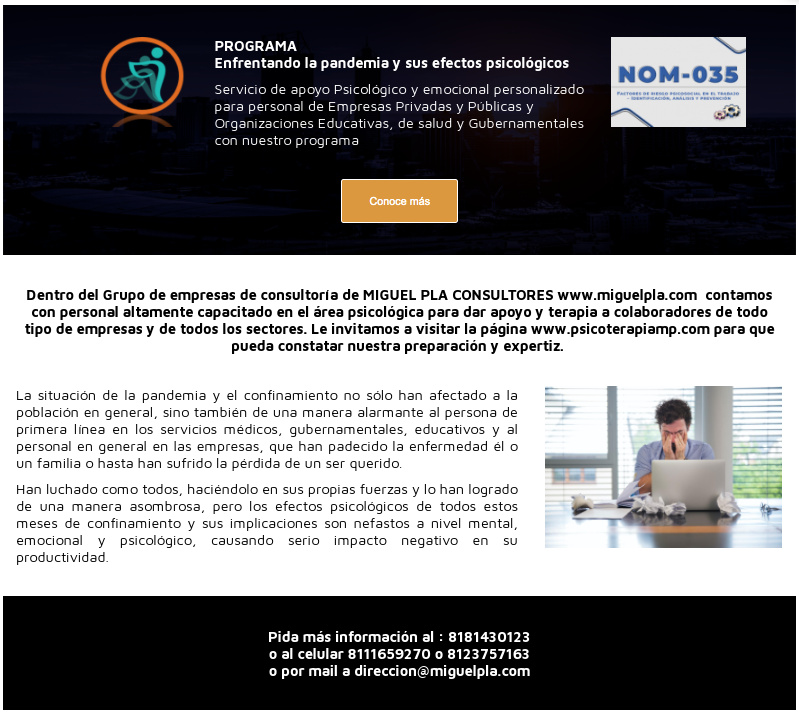Consulting Services
At MIGUEL PLA CONULTORES, our consulting services address the most critical factor involved in truly effective organization transformation: culture. Culture conditions people to think feel, and act in ways that may contradict profitability and/or effectiveness. Traditions, precedents, and past practices come to control what people do rather than being determined by what the situation requires. As a result, many organizations are being operated in ways that fit the past but are unsuited to existing or future conditions.
Organization Transformation/Culture Change
Organization Transformation requires a fundamental shift in the assumptions, values, beliefs that drive people’s behavior, their relationships, and norms. These dynamics are the largely hidden and underestimated force that will regulate the success and momentum of sought-after changes. They are simply a fact of life and always present. You cannot stop, suppress, or in some other way, avoid them. The only course for change to shine a bright light on them through capacity building and performance improvement skills that generate awareness, manage, and ultimately harness these dynamics in ways that advance organization transformation.
The bottom line is that if you put the work into your culture up front, countless strategy problems will be avoided, and creativity and innovation will thrive.
Organization Transformation and Culture Change
Change Management
Grid’s exclusive management consulting methodology for change management is truly an example of “teaching a man to fish.” In our experience, most organizations are very good at defining organization transformation and culture change strategies for what needs to change. However, preparing people to understand, support, and embrace how to execute change management is as important as designing the strategic culture change outcomes. Drs. Blake and Mouton, the founders of Grid International, said, “We know that people, if they want to, can make almost any strategy, no matter how inappropriate, work; or, if they don’t want it to work, they can prevent any strategy, no matter how appropriate, from working well.” Click here to see the Grid Process.
Change Management
Capacity Building
Most people don’t realize that every relationship has a culture. You don’t usually think of culture operating at the relationship level, or driving individual behaviors, but it has the lead role. The key to capacity building is to maximize the resources that every person brings to the table. Most capacity building and performance improvement strategies don’t include guidelines for how people should encourage trust and transparency, confront and manage conflict resolution, make decisions, promote and support candor, generate mutual support and accountability. This area of “soft skills” is often left alone to be established by chance. When you consider how deliberately people manage operational strategies and skills, it’s amazing how little effort is placed on managing relationships with a focus on capacity building and performance improvement.
The fact is that the soft skills drive the hard results and so we tackle them head-on with skills and tools that embed candor, trust and transparency, and full access to the valuable resources they control.
Capacity building
Leadership Development
Modern leadership development is more about creating behavior and norms that release power into the organization so entrepreneurial initiative develops and thrives at every level. Our management consulting approach to leadership development stands out by using the team rather than individual learning setting to embed leadership skills.
Our management consulting methodology puts every team member on a level playing field so individuals can’t use rank, power, or authority to drive team performance. This means he or she has to learn and practice relationship skills that maximize resources and promote individual and team performance improvement.
Leadership Development
Team Development
Our management consulting approach to team development gives every member a few weeks to learn and practice new candor skills in the workplace. Intact teams then complete a systematic process of evaluating the team’s purpose, defining soundest and actual team norms with action plans to close gaps, clarifying roles and responsibilities, and building profiles of each member’s behavior, its impact on team performance, and performance improvement goals. The process is rigorous and highly cathartic in relieving tensions and increasing mutual trust and transparency.
Team Development
Cross-Team Development and Conflict Resolution
Our management consulting Cross-Team Development process is designed to manage even the most highly contentious cross-team relationships in objective terms. The process includes a progression of sessions where groups work alone and then jointly to clarify and consolidate views around soundest and actual relationships. Then together, the groups define strategies for achieving their highest team and individual performance improvement.
The process mitigates blame and focuses on the best possible conflict resolution. People begin looking for ways to be creative and collaborative. As prevailing assumptions are exposed and understood groups can shift from their actual to their soundest working relationship.
The conflict resolution process can be used for new teams seeking to establish trust and transparency at the outset, with existing teams wrestling with poor conflict resolution that blocks collaboration, and even with two individual wrestling with an impasse.











